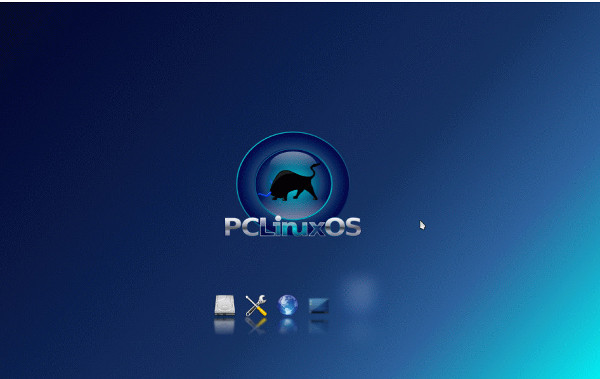The bull doesn’t seem to be part of PCLinuxOS anymore, as it was in 2010 when I first started using it. The distro changes its…
Posts tagged as “desktop”
Editor’s note: When a friend of ours shared this video on Facebook today, we just about went wild. To prove a point, a geek with…
Welcome to MicroApple.
It’s beginning to look as if Microsoft intends to get traction for Surface and other tablets running Windows by building a walled garden, creating more of the vendor lock-in that’s made Redmond famous. In other words, don’t expect to see any Microsoft programs ported to Android or iOS any time soon. Although this exclusivity has worked to keep the company’s monopoly intact in the past, this time it’s headed for failure. Windows has finally run out of steam.
I’m talking about Microsoft’s revelation last week that it has no immediate plans to make the tablet version of MS Office available on any platform but Windows. According to CNET, Redmond’s spin is that this is being done with only the user in mind:
Christine Hall has been a journalist since 1971. In 2001, she began writing a weekly consumer computer column and started covering Linux and FOSS in 2002 after making the switch to GNU/Linux. Follow her on Twitter: @BrideOfLinux
Sometime during the summer of 2006, the main computer at the shop where I worked suffered a motherboard meltdown. Since I’m not much of a hardware person, I took the box to my friends at Dragonware Computers. After diagnosing the problem, owner Michelle looked around the back room, came up with a used motherboard that would get the job done and installed it while I waited. Michelle always took care of me.
In those days the folks at Dragonware were very Windows centric folks. They hosted their own website on a white box running Windows, and they knew every trick in the book about configuring Microsoft products. It wasn’t surprising then that Michelle’s husband, Phillip, had a pre-release install of Windows Vista loaded on a box in the back room. It also was no surprise that he was in love with the soon to be released OS. Microsoft wrote the book on computing as far as he was concerned.
Christine Hall has been a journalist since 1971. In 2001, she began writing a weekly consumer computer column and started covering Linux and FOSS in 2002 after making the switch to GNU/Linux. Follow her on Twitter: @BrideOfLinux
Every tech writer on the Internet seems to want to be the one to crack the code and figure out what Microsoft plans to do with Surface. I thought I was one of them until I spent three days trying to write this article. I’ve come to the conclusion that I don’t really care what Microsoft’s plans are or if they’ll pan-out for them. They bore me. They’re irrelevant now.
I suspect we’re getting ready to see if they’re nimble enough to completely reshape their business model, much like IBM had to do more than a decade ago. Who knows what they’re going to do, now that they obviously recognize the-proprietary-operating-system-as-a-billion-dollar-property model has reached its sunset years?
Christine Hall has been a journalist since 1971. In 2001, she began writing a weekly consumer computer column and started covering Linux and FOSS in 2002 after making the switch to GNU/Linux. Follow her on Twitter: @BrideOfLinux
Android on tablets and smartphones may have primed the public to be willing to try a flavor other than Windows on their PCs and laptops, but this means next to nothing in the current computing environment. Consumers are going to buy what’s on the shelves at Best Buy, or what jumps off the screen at them on Amazon.com or Dell’s site. None of these venues are going to feature Linux boxes, at least not where you can find them unless you’re specifically looking for them. Why? There’s nothing in it for the retailers or manufacturers; it’s a zero-sum gain situation.
If an OEM started actively marketing Linux, for the most part they’d just be pushing people who are already buyers from one OS to another, nothing more. Except for those of us who’re already part of the Linux installed base, and our numbers are relatively few, they wouldn’t be selling any more machines or making any more money. They would only be creating more logistical problems for themselves.
Christine Hall has been a journalist since 1971. In 2001, she began writing a weekly consumer computer column and started covering Linux and FOSS in 2002 after making the switch to GNU/Linux. Follow her on Twitter: @BrideOfLinux
Nobody seems to want to talk about the desktop anymore. It seems that the trend followers have jumped to the next biggest thing. The glamor now isn’t in desktops and laptops, machines that do all the necessary grunt work, but in gee-whiz tablets and smart phones. This isn’t necessarily a bad thing, but desktops and laptops aren’t going to go away soon – not as long as there’s work to be done.
I mention this because it seems that many of the folks who write about Linux have all but given up efforts to increase the penguin’s share of the installed base. I find this curious, because I think we’ve never been better positioned to get folks to make the leap to Linux.
Christine Hall has been a journalist since 1971. In 2001, she began writing a weekly consumer computer column and started covering Linux and FOSS in 2002 after making the switch to GNU/Linux. Follow her on Twitter: @BrideOfLinux
Storm Bear Williams comes into the the FOSS Force office and plops onto one of two big, overstuffed chairs in our conversation pit. After a howdy, he says “I couldn’t find any microcassettes, so I got this.” He hands me a new, still in the box, Sony hand held digital audio recorder with a built-in microphone, good for 500 minutes.

He’s come for an interview. When I’d set up the appointment, I told him I was running low on microcassettes and asked if he could pick up a couple, just in case I needed them. When he discovered microcassettes are now obsolete and pretty much unavailable, he went ahead and sprang for something to get the job done.
A cynic might think this was only to curry favor, but I’ve known Storm for over twenty years, so I know better. For one thing, he doesn’t like to disappoint. For another, he’s pragmatic and always the businessman. He didn’t want the interview to go south just because it couldn’t be recorded.
Christine Hall has been a journalist since 1971. In 2001, she began writing a weekly consumer computer column and started covering Linux and FOSS in 2002 after making the switch to GNU/Linux. Follow her on Twitter: @BrideOfLinux
In the smartphone market, Android is now number one, according to a press release issued Friday by comScore, a company that measures online activity.
According to their figures, Android has passed RIM to take the top spot, with a 34.7% market share, up from 28.7% on December 10. During the same period, RIM’s share dropped 4.5 points, from 31.6% to 27.1%. Apple’s share remained relatively flat, increasing slightly from 25.0% to 25.5%. Microsoft and Palm dropped 0.9%, and now claim 7.5% and 2.8% respectively.
Christine Hall has been a journalist since 1971. In 2001, she began writing a weekly consumer computer column and started covering Linux and FOSS in 2002 after making the switch to GNU/Linux. Follow her on Twitter: @BrideOfLinux

